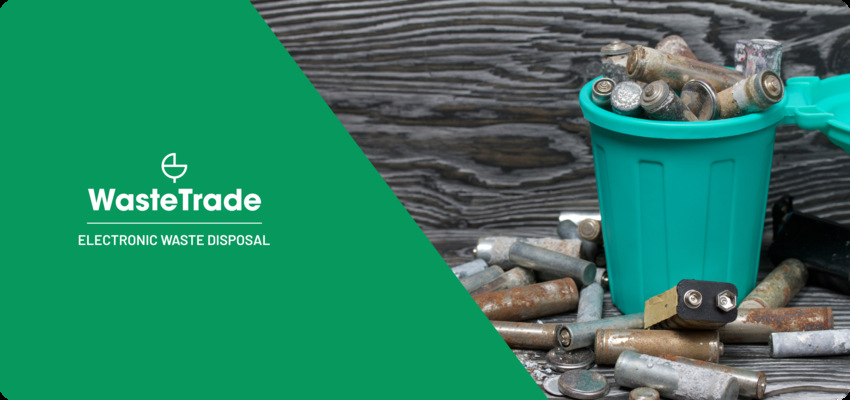Likvidácia elektronického odpadu

In today’s digital age, electronic waste disposal has become a pressing concern as technology advances and older devices are replaced. Finding effective e-waste solutions is crucial to reducing environmental impact and promoting sustainability. In this article, we will explore the importance of electronic disposal, strategies to recycle old electronics, and how WasteTrade, the global waste marketplace, connects buyers and sellers of waste materials to facilitate responsible e-waste management. Join us as we delve into the world of electronic waste and discover the benefits of sustainable disposal practices.
Dispose Of Electronics

When it comes to disposing of electronics in the UK, it is crucial to understand the potential environmental impact of improperly discarding such items. Electronic waste, or e-waste, contains hazardous components like lead, mercury, and cadmium that can seep into the soil and water if not handled correctly. To mitigate these risks, it is recommended to recycle old electronics through designated facilities or collection points. Many local councils offer e-waste recycling services or organize special collection events to make the disposal process easier for residents. By choosing responsible disposal methods, individuals can contribute to reducing pollution and preserving natural resources.
Furthermore, donating old electronics to charitable organizations or refurbishing them for resale is a sustainable option that helps extend the lifespan of these devices. Many charities accept donations of working electronics, which can benefit those in need while diverting e-waste from landfills. Additionally, some businesses specialize in refurbishing and reselling second-hand electronics, offering a cost-effective alternative to buying new devices. By embracing these alternatives to traditional disposal methods, individuals can support a circular economy that promotes the reuse and recycling of electronics, leading to a more sustainable and environmentally friendly approach to managing e-waste.
Electronic Disposal

Electronic disposal, also known as e-waste recycling, is a critical environmental issue that needs to be addressed urgently. The rapid advancement of technology has resulted in a significant increase in the production of electronic devices, leading to a corresponding rise in electronic waste. Improper disposal of these devices can have detrimental effects on the environment as they contain hazardous materials such as lead, mercury, and cadmium. These toxins can leak into the soil and water, polluting the environment and posing serious health risks to humans and wildlife.
To combat the growing problem of electronic waste, proper disposal and recycling of electronic devices are essential. Many countries have established e-waste recycling programs to encourage individuals and businesses to responsibly dispose of their old and unwanted electronics. These programs aim to recover valuable materials from electronic devices, reducing the need for extracting raw materials and minimizing the environmental impact of electronic waste. By raising awareness of the importance of electronic disposal and participating in recycling initiatives, we can all play a part in protecting our planet for future generations.
E Waste Solutions
Electronic waste, or e-waste, poses a significant environmental challenge in the modern world. With the rapid advancement of technology, electronic devices are being discarded at an alarming rate, leading to pollution and resource depletion. To combat this issue, various e-waste solutions have been developed. Recycling is a key strategy in managing e-waste, where electronic devices are broken down and their components are reused or repurposed. Many countries have established electronic waste recycling programs to encourage proper disposal of electronic devices, preventing them from ending up in landfills.
Another effective e-waste solution is product stewardship, where manufacturers take responsibility for managing their products throughout their lifecycle. This approach encourages manufacturers to design products that are easier to repair, upgrade, and recycle, reducing the environmental impact of electronic waste. Moreover, initiatives such as electronic take-back programs promote the return of old or unwanted electronic devices to manufacturers for proper disposal or recycling. By implementing these e-waste solutions, we can mitigate the environmental impact of electronic waste and work towards a more sustainable future.
Recycling Old Electronics
Recycling old electronics is becoming increasingly important in today’s society as the amount of electronic waste continues to grow. Discarding old gadgets such as smartphones, laptops, and tablets in a responsible manner is crucial to reduce the environmental impact of electronic waste. By recycling old electronics, valuable materials like gold, silver, and copper can be recovered and reused, reducing the need for the extraction of raw materials from the earth.
Many local councils and electronic retailers in the UK have established recycling programs to make it easier for individuals to dispose of their old electronics in an environmentally friendly way. These programs often involve drop-off points where old devices can be taken for recycling, ensuring that they are processed in a safe and sustainable manner. Additionally, some manufacturers now offer trade-in schemes where customers can exchange their old devices for a discount on a new purchase, further incentivizing the recycling of electronics. By encouraging and promoting electronic recycling initiatives, we can all play a part in reducing electronic waste and protecting our planet for future generations.
